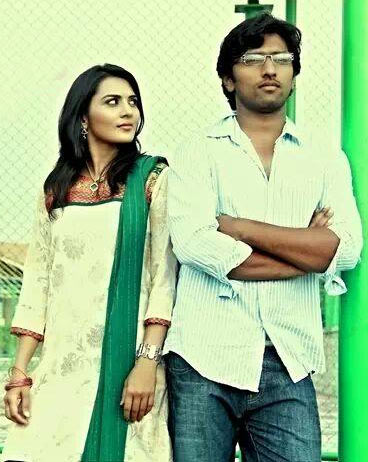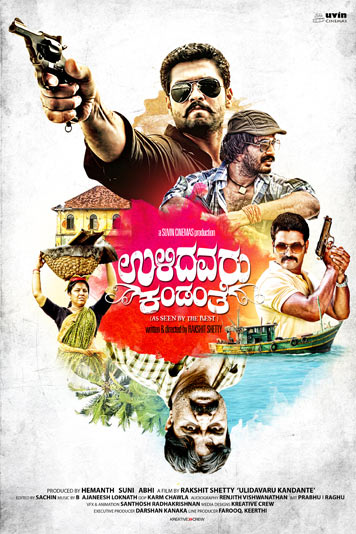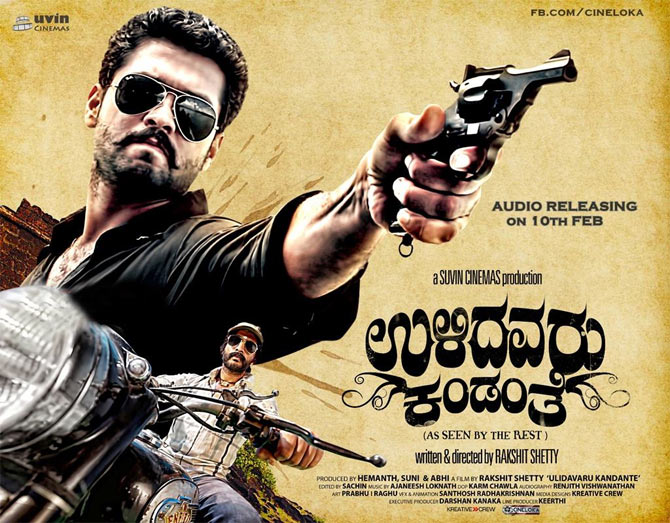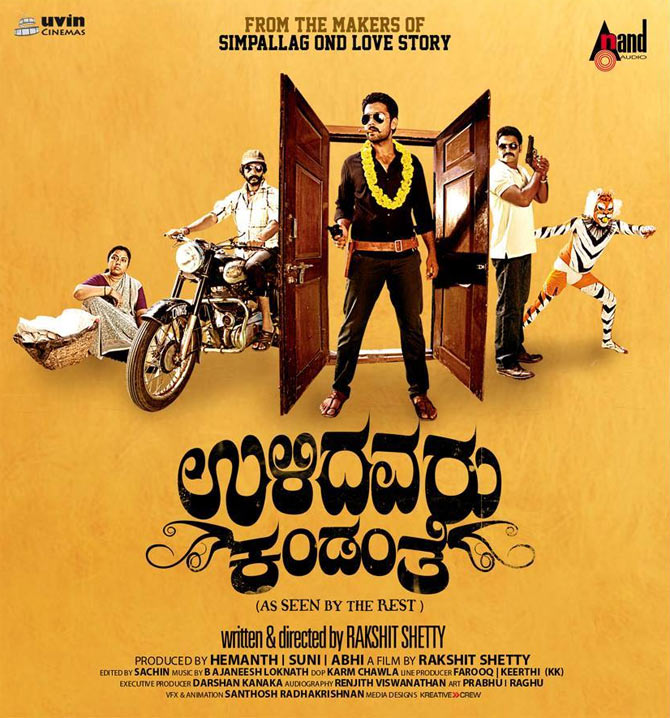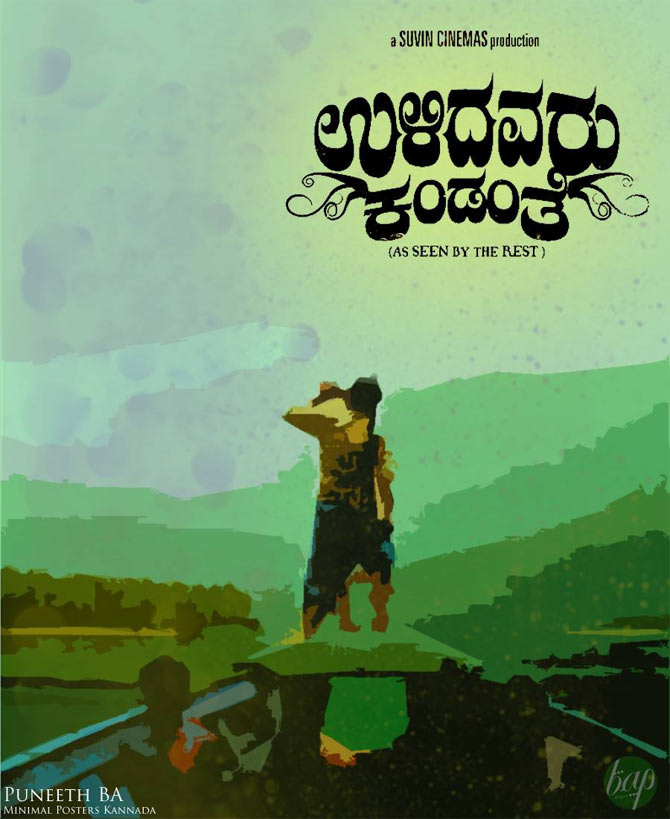 | « Back to article | Print this article |
'There is a notion that A R Rahman delivers his best only for Mani Ratnam'
'There are many talented musicians and composers in Karnataka too, but we need support.
We are capable of providing quality music and also reaching the standard set by the Tamil or other industries and even set our own standard for that matter.'
Music composer Ajaneesh Loknath talks about composing music for Ulidavaru Kandanthe and why he think music composers in Karnataka need people who are open to experiment.
Ajaneesh Loknath, the music composer for actor Rakshit Shetty’s directorial debut Ulidavaru Kandanthe (As seen by the rest) is a happy man.
The audio released early this week and music lovers and the film fraternity have been raving about the album’s ‘new sound’.
Soft spoken and modest, Ajaneesh Loknath is a talent that is here to stay.
Ajaneesh talks to rediff.com about Ulidavaru Kandanthe and his experience of working with Rakshit Shetty.
 The response to your music in Rakshit Shetty’s Ulidavaru Kandanthe has been phenomenal on social media platforms. How has the market received it?
The response to your music in Rakshit Shetty’s Ulidavaru Kandanthe has been phenomenal on social media platforms. How has the market received it?
I hear it is doing well. I haven’t had the time to check as I have been busy with the re-recording for the film, but I am told the response online has been very good. People have been downloading it since the first day of its release.
Your debut film was Shishira back in 2009. What took you so long to be back in the mainstream?
Shishira did not do well at the box-office although it gave me a good name as a composer.
The background score was appreciated. It was talked about more than the songs.
As you know, success at the box-office is what matters. I did not get many opportunities immediately. Then Varshathaare released and now I have Nan Life Alli and Ulidavaru Kandanthe ready for release.
'I was more than happy to be a part of Ulidavaru Kandanthe'
Ulidavaru Kandanthe sounds very fresh, very new sound; probably the first of its kind at least in the Kannada industry. How have your peers and the industry responded to the album?
I believe they love it and they have been telling me it is refreshing.
I feel elated when they call me to tell me that everything sounds fresh - the programming, the selection of voices, the arrangement, everything.
How did Rakshit Shetty sign you up for Ulidavaru Kandanthe?
Rakshit and I have met a couple of times long before his Simplag Ondu Love Story released.
He once approached me to do the re-recording for a short film called Confessions of a dust bin. We bonded well.
He told me that he will soon be making his debut as a director and he would like me to score music for his film.
I was more than happy to be a part of his venture.
'The only two composers I haven't worked with are Mr Harikrishna and Mr Manomurthy'
How did you get into music?
My maternal grandmother was a prolific veena player. My father had a music troupe called Bhadravati Brothers.
I started by working as a keyboard player in the Kannada music industry in the year 2003. I have played for several composers - Mr Kalyan, Mr Manohar and many others.
The only two composers I haven’t worked with are Mr Harikrishna and Mr Manomurthy.
Like how many others begin, I was into composing jingles for ad-films and television.
Ulidavaru Kandanthe is not a traditional album. It is very Tarantino-ish. Rakshit told me that he is a huge Quentin Tarantino fan. What was the brief you got from him for Ulidavaru Kandanthe?
Rakshit has a terrific visual sense. The movie has several chapters and we were composing for each of them with a specific theme in mind.
He did tell me that it has to be on the lines of Tarantino’s films and very cow-boyish sometimes, and sometimes he wanted a very south Canara (coastal Karnataka) folk flavour in the music.
It was very challenging. He was very open to whatever suggestions came from my end during the composing sessions. I had to keep in mind that the movie was set in the late 80s and early 90s.
I would credit Rakshit’s inputs and his amazing visual sense and imagination that inspired me to come up with what I did in Ulidavaru Kandanthe.
'The film is set in the early 1990s'
How would you describe your experience working on the re-recording? I believe this is the first Kannada film shot in live sound?
It is going good. I would like to share one particular experience in composing for the Huli Vesha (Tiger Dance) track. We had to record it live with those folk artists who perform during festivals in coastal Karnataka.
We set up a studio at Rakshit’s grandmother’s house in Udupi, which was very calm and serene. We then brought in the folk musicians and got them to play.
I asked them to play the way they do regularly during the Krishna Janmashtami festivals in that district. As they were playing, I composed and gave it to them to practise and then we recorded it.
Ideas kept flowing as they played and with the help of the director’s inputs, I created some samples and then a sound pattern and that’s how we went about doing it.
We even recorded the rhythm portions for The Final Showdown there. We then came back to Bangalore and re-worked it in my studio.
Talking about Tiger Dance, it has this very Yakshagaana or theyyam sound to it. Somewhere in between, after Rakshit’s voice-over, you go on to play Santhoshakke, Ilayaraja’s famous Shankar Nag song. Was that the demand of the script?
The film is set in the early 1990s and then, yes, it is the demand of the script.
I cannot tell you more on that at this point, but it is an entry point and Rakshit gave me references to Baa baa ro ba Ranadheera and Santhoshakke. The situation is such.
'There are many talented musicians and composers in Karnataka'
Gaatiya Ilidu has a very early-90s feel to it again.
Yes, it was situational and it had to be reminiscent of the 1990s.
For most of us in Karnataka, Hamsalekha’s music is a reminder of those times…you know, songs that begin with a female chorus, dakshina Kannada folk flavour… but at the same time it also had to be contemporary.
If you observe the bass, it is very contemporary; the style of the guitar and the pattern of the violins and the way the singer renders the song, however will remind you of the 90s.
A lot of people on social media and blogs have been comparing your album with the kind of sound that Sneha Khanwalkar or Santosh Narayananan produce in Hindi and Tamil respectively. Do you think the change in Kannada music is comparatively slow?
Personally, I think there is a block. See, one cannot clap with just one hand. There are many talented musicians and composers in Karnataka too, but we need support.
We need more people who are open to experiment, in scripts, music, technology, everything.
We are capable of providing quality music and also reaching the standard set by the Tamil or other industries and even set our own standard for that matter.
We also need directors who can push us and inspire us. There is a popular notion that A R Rahman delivers his best only for Mani Ratnam, though he has given brilliant scores to other filmmakers too.
What I am saying is we need filmmakers to boost our imaginations. Only then will we, as composers, be able to raise the bar for music in Kannada.
